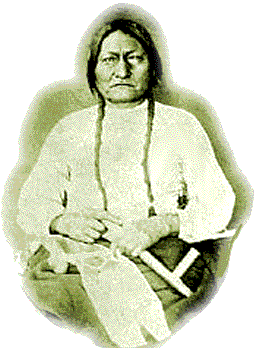Sitting Bull - Hunkpapa Sioux
Tatanka Yotanka
"Is it wrong
for me to love my own? Is it wicked for me because my skin is red? Because I am Sioux?
Because I was born where my father lived? Because I would die for my people and my
country? God made me an Indian."
Sitting Bull, or Tatanka Yotanka, was born on Grand River in South Dakota. He was well known for his generosity, courage and wisdom. Ever since the Lakota had started to feel the pressure of the white expansion in the west of the United States, Sitting Bull fought against the white intruders as fiercely as he had fought hostile tribes in the past. When in 1867 the settlers threatened the Hunkpapa hunting grounds, Sitting Bull distinguished himself by his leadership and became chief of the Teton Sioux Nation. Although the Fort Latramie Treaty put an end to the war with the whites, a new threat came with the discovery of gold in 1868 in the Paha Sapa, or Black Hills, the sacred mountains of the Lakota. In a vision during a Sundance ceremony, Sitting Bull foresaw his victory over the white soldiers: a few weeks later, himself, Crazy Horse and Gall successfully wiped out George Custer's army at Little Big Horn (1876). After their victory, Sitting Bull and his supporters fled to Canada.
Bureau of American Ethnology |
|
 |
When in 1881 Sitting Bull
came back to the United States, he and his followers gave themselves up to the American
Army. He spent 2 years in prison before being sent to the Standing Rock Reservation. In 1885, Sitting Bull was released and allowed to join the troup of Buffalo Bill and his Wild West Show. and traveled as far as Europe. The officials allowed him to tour with the troup because it was better to keep him away from the reservation where he could create trouble. However, despite his absence, Sitting Bull's reputation remained intact and when he returned, other chiefs often sought his advice.
. |
"This nation is like a spring freshet; it overruns its banks and destroys all who are in its path. We cannot dwell side by side. Only seven years ago we made a treaty by which we were assured that the buffalo country should be left to us forever. Now they threaten to take that from us also. My brothers, shall we submit? or shall we say to them: 'First kill me, before you can take possession of my fatherland!" |
However, the United states Government didn't give up, preferring to convince the Sioux that the land would be taken from them anyway and that they might as well derive some benefit out of breaking up their reservation. With the support of the chief spokesman of the Sioux, John Grass, and without Sitting Bull's knowledge, they managed to settle the matter with most of the Sioux chiefs. When Sitting Bull was asked by a newspaperman how the Indians felt about giving up their lands, he expressed his disappointment and his frustration with a shout: "Indians? There are no Indians left but me!" In 1890, Sitting Bull permitted his people from Grand River to join the Ghost Dance ceremony. He was arrested at his home at Standing Rock reservation, as during the resulting skirmish, he and all of his followers wre slain by Indian police. His remains are buried near Mobridge in South Dakota . He is still revered at Standing Rock Reservation.
|
|
"If the Great Spirit had desired me to be a white man he would have made me so in the first place. He put in your heart certain wishes and plans, and in my heart he put other and different desires. It is not necessary for eagles to be crows." |